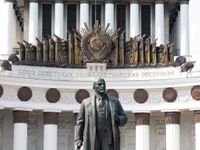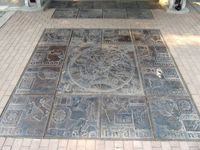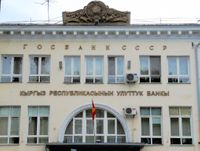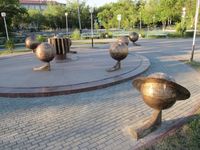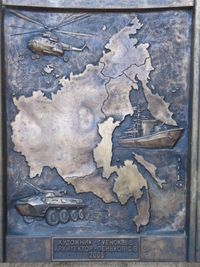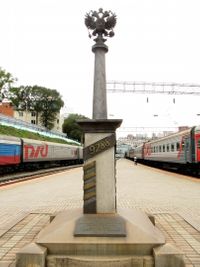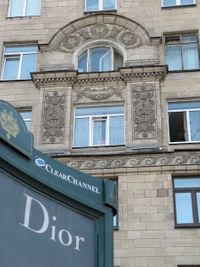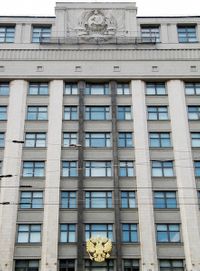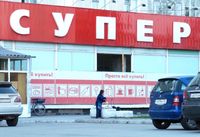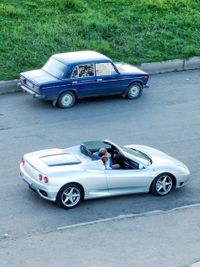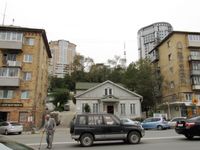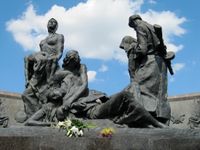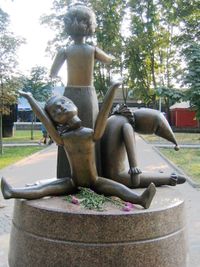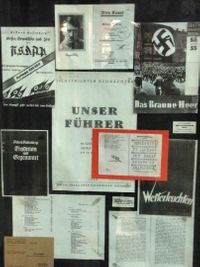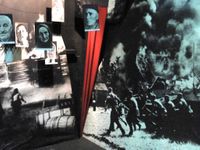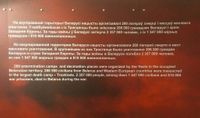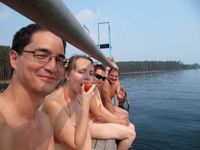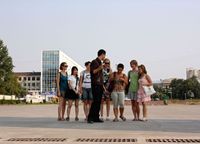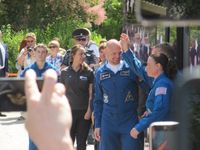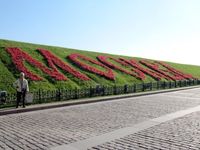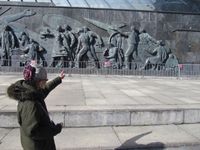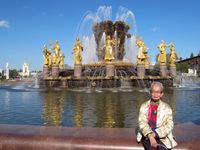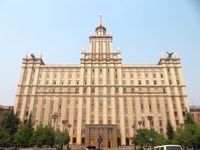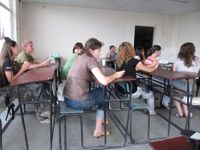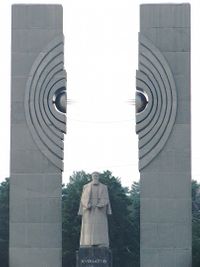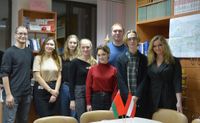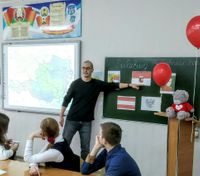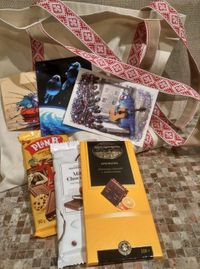Additional considerations for my interest in the post-Soviet space
I already described my interest regarding the Eastern part of Europe, which started already back in school.
After graduation from school I continued - after some detours – to follow my interest and studied political science, where I focused on Eastern Europe, Russia and post-Soviet space. In my thesis I finally tried to elaborate the corner stones defining the Russian identity and if the country respectively the Russians are really that „irrational“ or weird acting as they are usually displayed in the West. My thesis (pdf) can be downloaded here (German language only): https://othes.univie.ac.at/11630/
But to be more specific: where does my interest come from? I cannot really say where it started exactly. I'd say that it was a mixture of 2 points:
When growing up you (at least me) watch the world and ask if the world you know has to be like it is, respectively if it is the one and only way?
Sure, when I was in school in the 1990s the Eastern Bloc/USSR did not exist any more. But I can remember watching the news following the process of decay of the USSR and Russia (the shooting of the Duma etc.), the break-up of Czechoslovakia and the ongoing civil war in neighbouring Yugoslavia – and I wanted to understand what was going on and why?! This means not only to explain the present, but even more to understand the past leading to the present.
And finding out about the past made me more and more curious to find out that there was „half of the world“ living another life in a different system than I know and lived in.The second reason, I would say, was my father. He, being a child in WWII (Great Patriotic War), was interested to find out how all this (the Nazi-Regime and cruelties) could happen in Austria and Germany. As he was working in the University, he researched a lot on this topic and his field of activity was psychology, respectively psychoanalysis. Somehow I followed his footsteps and started to watch (with him) documentaries etc. about WWII; and in fact, the war in the East, specifically against the „bolshevik Soviets“, was and is always a focal point when it's about this fierce conflict.
I assume that my interest was already aroused at this stage, leading to my first topics in school, then my studies in university, later my journies in Eastern Europe, Russia and Central Asia and finally living and working in Minsk. All following fotos show the legacy (additional description when you click/zoom in):
What I wanted to find out
But in opposite to my father, who was interested and researching on the German/Austrian people, I was more interested in the „other side“, meaning the Eastern European. I was interested to learn the difference. Why was the East orthodox? Historically going another way than the West? Why was the political system different (not only the so called socialistic system, but also the czarism was different than the monarchies in the West)? And many other questions. And in the end cumulating in the climax of WWII?
By the way, do you know the difference between the term „World War II (WWII)“ and „Great Patriotic War“ respectively why you cannot (should not) understand it synonymously? If not just a short exlanation: WWII began 1st September 1939 and finished 2nd of September 1945 when Japan surrendered. But also here we see and understand the war in an eurocentric way, so for most people it ended in the night of 8th of May 1945 – and because of time shift on 9th of May in USSR.
But these dates do not correspondent for the USSR. First they were not involved in the war Hitler began, and for them the Great Patriotic War started with the Invasion on 22nd of June 1941. Second the USSR was never fighting „in the world“ but mainly inside the own territory and later on pushing back German forces. Regarding Asia, where the USA fought Japan, they just joined in August 1945 because they promised the allies in the conference of Jalta to do so. In fact, USSR was hardly involved in Asia and was only active for about 4 weeks before Japan surrendered. However, they also have the term WWII but do not use it that often or do not feel involved in the worldwide war as they struggled for their own life in their Great Patriotic War, that's the reason why.
To get back, I was also or even more curious to find out how people in Eastern Europe lived after the horrible war ended. How their life was looking like, how it progressed, the dreams, the ideas – but also the downfall and implosion of the Bloc and how people are living now. And here I have seen a lot of weird contrasts drawing on the one hand side a funny, on the other hand side strange picture:
Atrocities of War
During my travels I met a lot of people and especially when travelling in Russia I never got someone to know whose family was not affected by the war and lost relatives - literally nobody who did not had to lament about a killed father, mother, grandfather etc! Especially Belarus suffered a lot:
Within my family, on my fathers side to be exact, was also the loss of my grandfather. The only detail I know is that he died somewhere in Ukraine, north of Kiev. In general, in the German and Austrian society the war was a topic people were hardly talking about after the war. The whole regime was a criminal one and too many crimes happened, so people did not and could not talk about.
And in face of all this atrocities and sad things committed by the German forces during the war, I never experienced hate or other hostile emotions from post-Soviet societies, but more the opposite: some kind of respect what the opponent of the past, who wanted to wipe them out, achieved since then. Because of that I was and am still impressed that people from, let's say Russia or Belarus, are not strictly against Germans or Austrian after all what happened (even though Austrians always have some kind of „bonus“).
Surprising friendliness and hospitality
When travelling in Russia and post-Soviet countries and talking with people, my experience was interestingly more of that kind that people differentiated between politics respectively the political system people were living in the past, and the people from today. And instead of antipathy people showed curiosity. A gift that people in the West - in my opinion - are lacking. For example, at the start of the Soyuz in Baikonur in June, all were cheered at, regardless where they came from. I would not be sure if people would have cheered towards the Russian Kosmonaut, because people very often connect people with what happens in his/her country....
Maybe I was only lucky, however, these experiences deeply impressed me and left a feeling of responsibility. Responsibility not in feeling „guilty“, what is always discussed within the (German/Austrian) society, but to respect the people from Eastern Europe, what they have gone through and survived. There were and are reasons why they live and act how they do. It's not on us to judge them – people have to judge themselves about what is right and/or wrong.
And I also respect what was created and achieved, regardless if in the past or in the present. I also respect, that not all and everyone is living the same way as we do and not everything (and everyone) is going and working like our system does. This is what I criticise when „we“ complain about other countries and people: not to act like we do or not acting like we want them to act.
I have to repeat that in my opinion it's not on us to judge others, but people or societies have to judge themselves and their doings. And it's all right not to like things, specific facts and tendencies - and I can take consequences, but not judge.
Awakening my mum's interest - but also others'
Last but not least: After travelling so often in Eastern Europe and post-Soviet space, what my mother never could understand (but also friends), I was able to persuade her one day to spend with me a weekend in Moscow as a birthday present. I tried to show her the differences and if she could see them or if Moscow is like „any other city (in the West)“... And indeed, she realised that there are differences and had a very good time. She enjoyed the trip and guess what: even though she could not understand a word she liked the people there (but I have to say that we were very lucky as they were very helpful to us :)
But also friends can hardly understand my interest. When I told friends about my plan to go to Central Asia, a reaction was "what? on the way to south-east Asia we flew over and there is nothing but sand" :o)". Nevertheless, when my plan, to go to Minsk/BY, got real, a lot of friends got eager to take the chance and visit me. Because they only know that there is a country and maybe the president's name but nothing more - and they are curious to see and find out.
Search for challenge and a feeling of "Responsibility" led me to BY/Minsk
Above I used the term „responsibility“. I already explained that it's not about guilt or to blame someone. For instance, I already told that my grandfather was fighting in the war. I do not know him and have no idea what he did. In addition, my mother is even not from the European continent, but still I feel some kind of responsibility – that something like this shall not happen again! And if possible: to give back what was taken and trying to build a connection and better understanding. Even though I have to say that it is not easy as politics is often and sadly shadowing relations between people...
After studying and travelling, I was always thinking about the possibility to work in the East. Because reading about the East (or watching documentaries and movies) is only theory, and travelling usually mainly shows the „bright sides of life“...although I knew about difficulties and problems of everyday life. However, experiencing them is something different than just reading about these or getting told about them.
In my last company in Austria I already could get in touch with the region of my interest, but still was not directly dealing as I was just in the business development and therefor only teleworking with companies and people. After couple of years I felt the time was come to look for a new challenge, but also to work and get in contact with people directly. So I decided to reorientate and completely change my profession. Here I have to tell a story when I was travelling 2010 in the Russian Federation. When I was in Chelyabinsk I was invited to join an English club in the university (see the foto below and in the Russia 2010 album; by the way, universities are not public like they are in Austria, so I was smuggled in because I had no official document/propusk to go inside ;). This was a very nice experience because students there do not get often the possibility to meet a foreigner and they were very curious. I was telling them about me, my journey in Russia and Austria. And we came to the topic what was quite interesting because you could say that everyone knows Germany but not necessarily Austria. So we got to the point where I was telling them about the differences about Germany and Austria but also what differentiates people from Austrian and Germany, and there were some surprises for the students :) This was my first experience with students and stayed in my mind.
In 2019 I applied at the Austrian Agency for International Cooperation in Education & Research (OeAD) and succeeded to go to Minsk – and here I am now. Teaching students/working with people in the field of culture is pleasant – but the (world) situation at the moment (2020) makes it a bit frustrating.
Anyway, as I learned and travelled a lot in the area I dare to say that I can understand the mentality of the people a bit. And I'd also say that it already helped me to estimate the situation, how to communicate and treat them and what topics they are interested in and what motivates them. Because the education system here (in Minsk/Belarus but in general in the post-Soviet space) is different than ours, what I already knew but this only in theory. And it was interesting to experience it now in real.
What I see a little bit of „problematic“ is that the relation between the West and East is mainly driven by but also focused on the war. Sure, this is something depressing but new relations should build upon something more easygoing and not only to remember the war, devastation and slaughter of people but show the positive sides and things of each nowadays country and people! Especially when you keep in mind how hard people have to work and/or the students have to study. Here I try my best to contribute in questions of education on the one hand side, but on the other hand side also bring in other aspects which cheer people/students up. Learning has not to be only strict and boring but also interesting and funny. And I would say that I was successful as the response until now was pretty positive and I try to keep it up:
